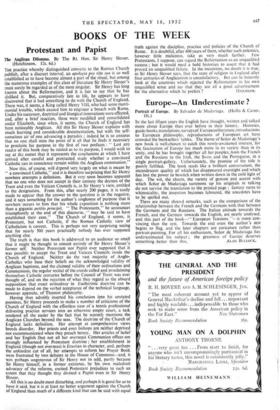BOOKS OF THE WEEK
Protestant and Papist
The Anglican Dilemma. By The Rt. Hon. Sir Henry Slesser. - (Hutchinson. 12s. 6d.) THE practice whereby distinguished converts to the Roman Church publish, after a discreet interval, an apologia pro vita sua is so well established as to have become almost a part of the ritual, but among the numerous examples of this class of literature Sir Henry Slesser's must surely be regarded as of the most singular. Sir Henry has long known about the Reformation, and it is fair to say that he has disliked it. But, comparatively late in life, he appears to have discovered that it had something to do with the Church of England. There was, it seems, a King called Henry VIII, who had some matri- monial trouble, which caused him to engineer a breach with Rome. Under his successor, doctrinal and liturgical innovations were effected, and, after a brief reaction, these were modified and consolidated under Elizabeth, since when, it seems, the Church of England has been noticeably Anglican. All this Sir Henry Slesser explains with much learning and considerable documentation, but with the self- conscious air of one advancing a paradox ; indeed he is so anxious that no one shall miss the point of it all that he finds it necessary to proclaim his purpose in the first of two prefaces : " Lest any reader of this book may be misled as to its purpose, I would wish to say at the outset that it represents the conclusions at which I have arrived after careful and protracted study whether a convinced Catholic can in conscience remain within the Anglican communion."
Now this, of course, will depend very largely on what is meant by "a convinced Catholic," and it is therefore surprising that Sir Henry nowhere attempts a definition. But it very soon becomes apparent that no one who does not accept in their entirety the decrees of the Trent and even the Vatican Councils is, in Sir Henry's view, entitled to the designation. From this, after nearly 200 pages, it is easily made to appear that the answer to the question is in the negative, and it says something for the author's singleness of purpose that it nowhere occurs to him that his whole exposition is nothing more than a gigantic petitio principii. "The Protestants," he announces triumphantly at the end of this discourse, ." may be said to have established their case." The Church of England, it seems, is Protestant, but not Catholic, if the Roman Catholic view of Catholicism is correct. This is perhaps not very surprising seeing that for nearly 500 years practically nobody has ever supposed anything else.
The truth is that this book is addressed to an audience so small that it might be thought to consist entirely of Sir Henry Slesser's former self. Neither Protestant nor Papist ever supposed that it was possible to accept the Trent and Vatican Councils inside the Church of England. Neither do the vast majority of Anglo- Catholics who base their beliefs on the acknowledged validity of Anglican baptisms, and the claimed validity of their ordinations and Communions, the regular recital of the creeds called and proclaiming themselves Catholic centuries beforethe Council of Trent was ever thought of, and on the rejection of what they regard as the absurd supposition that exact orthodoxy in Eucharistic doctrine can be made to depend on the verbal acceptance of the technical language, however apposite, of Thomist philosophy.
Having thus adroitly inserted his conclusion into his unstated premises, Sir Henry proceeds to make a number of criticisms of the Church of England with the effortless ease of a tennis professional delivering practice services into an otherwise empty court, a task rendered all the easier by the fact that he scarcely mentions the Anglican Churches beyond the seas. The doctrine of the Church of England lacks definition. Her attempt at comprehensive views breeds disorder. Her priests and even bishops are neither deprived not excommunicated when they preach heresy. Her articles of belief and her English (but not all her overseas) Communion offices are strongly influenced by Protestant doctrine ; her establishment in England (though not overseas) is Erastian in character, and, perhaps the unkindest cut of all, her attempts to reform her Prayer Book were frustrated by two debates in the House of Commons—and, it was perhaps ungenerous of Sir Henry not to add, partly because Sir Henry himself, in a former existence, by his own maladroit advocacy of the reforms, excited Protestant prejudices to such an extent that they thought they divined -a Papist even in Sir Henry Slesser.
All this is no doubt most disturbing, and perhaps it is good for us to have it said, but it is at least no better argument against the Church of England than much of a different kind that can be said with equal truth against the discipline, practice and policies of the Church of Rome. It is doubtful, after 400 years of them, whether such polemics, however little malicious, take us very much further. Few Protestants, I suppose, can regard the Reformation as an unqualified success ; but it would need a bold historian to assert that it had proved an unqualified failure. In the meantime, no doubt it is true, as Sir Henry Slesser says, that the state of religion in England after four centuries of Anglicanism is unsatisfactory. But can he honestly look at the countries which rejected the Reformation in his own unqualified sense and say that they are all a good advertisement for the alternative which he prefers ? HAILSHAM.


































 Previous page
Previous page